Top 11 Things to Do in Modena in a Day

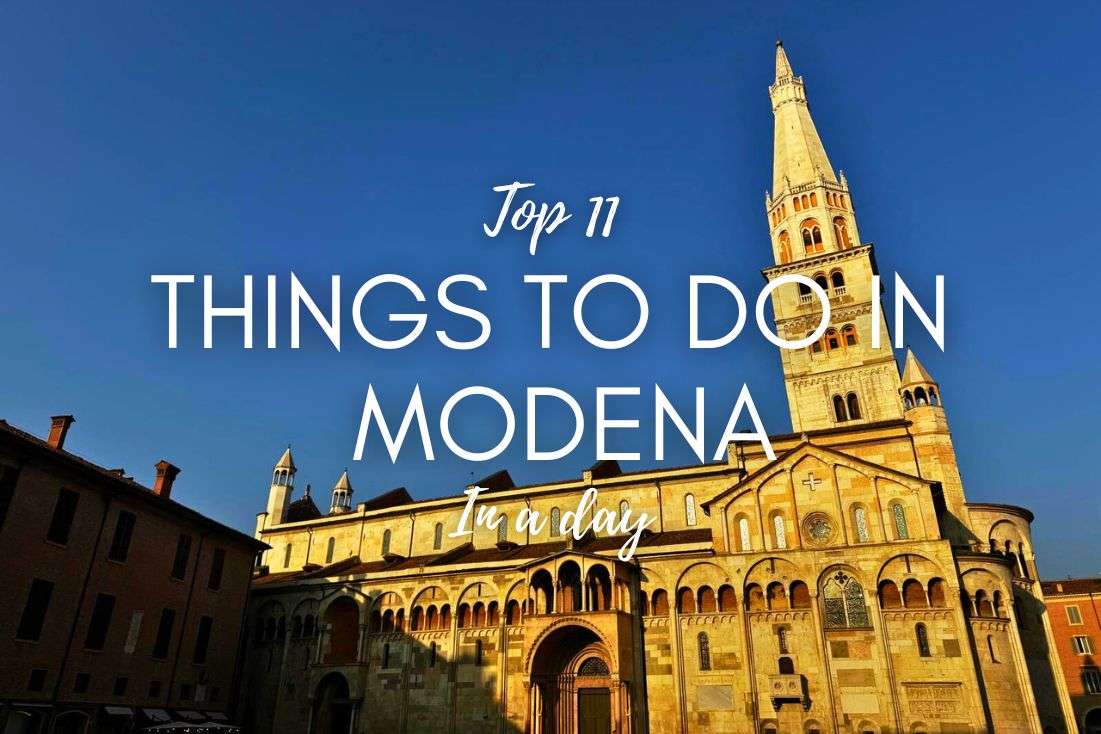
My ranking of the top things to do in Modena, Italy:
Map of things to do in Modena for a day
A few top tips before we go into detail about things to do in Modena
My tip for a hotel in Modena Italy: RMH Modena Des Arts
1. 4 Madonne Cheese Factory—Taste all ages of Parmigiano Reggiano
2. Acetaia Giusti—Be surprised by how hard it is to make traditional balsamic vinegar
3. Casa Museo Luciano Pavarotti—Learn about a genuinely nice person
4. Duomo di Modena—Marvel at the works of the old masters
5. Panini Museum—Much better value for money than Ferrari (cost: free)
6. Ferrari Museum, Maranello—Expect far fewer cars than you’d hope
7. Enzo Ferrari Museum—Expect even fewer cars, but more history
8. Torre Ghirlandina—See the city through iron bars
9. Museo Archeologico—Unearth ancient treasures
10. Palazzo Ducale di Modena—Snap some stunning pics
11. Museo Civico di Modena—Explore Modena’s Rich Civic History
See Modena in a day: itinerary
I’ve summarized this list of the best things to do in Modena and created a plan for what to do in Modena in a day, based entirely on my own experience—no fluff included. I don’t rely on media hype, reviews, or TripAdvisor.
First, I’ll focus on describing each spot and giving you my insider tips, and at the end of this article, you will find my comprehensive one-day itinerary for Modena.
So, why come to Modena in the first place? To experience the Ferrari Museum in Maranello and the Enzo Ferrari Museum first and foremost, but also the historic old town (Duomo di Modena and Ghirlandina), and the incredible stories and food museums that surround it, all conveniently located near Modena’s city center.
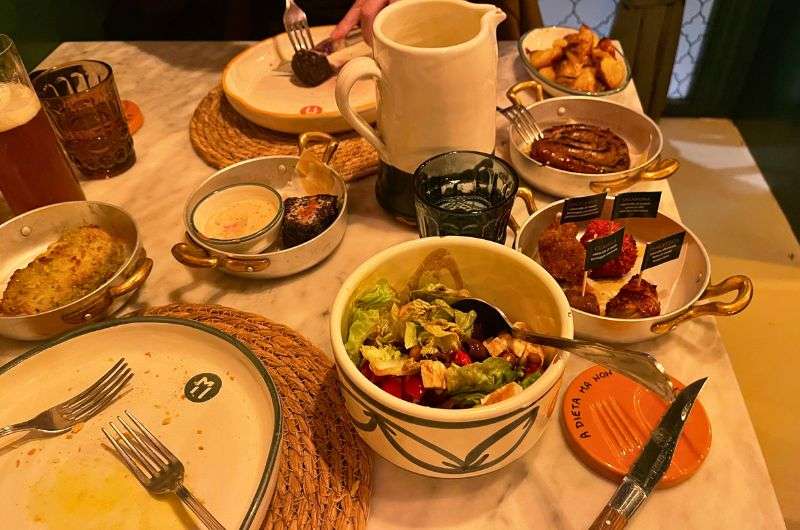
Modena’s restaurants are second to none
Heads up: Modena is part of Emilia-Romagna, often considered the food capital of Italy. Even though I’m sure many other regions in Italy would strongly disagree, from the perspective of a foreigner who has explored most of Italy—Moden really feels like they have the upper hand.)
After six months of traveling in Italy and over 20 visits, I feel confident about what’s worth seeing and what’s not. I can tell you right now: Modena ranks very high on my list of Italian destinations, and for entirely different reasons than I originally expected. If you want to compare and contrast, find out more about Italy.
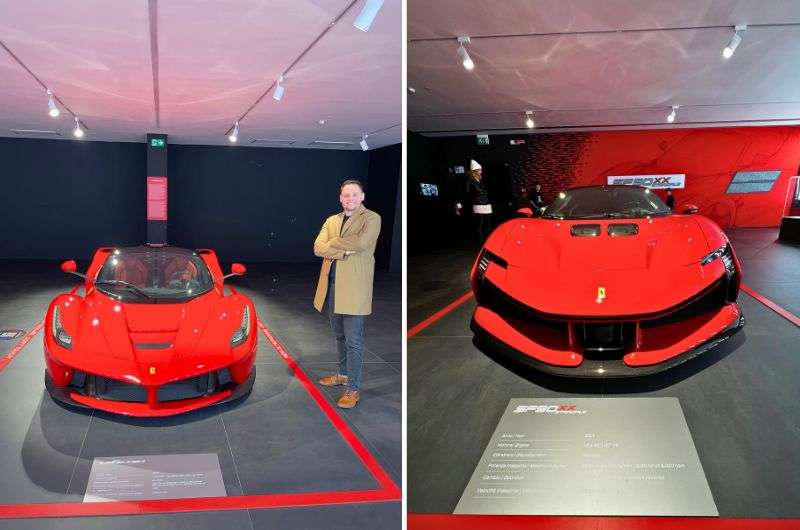
The Ferrari Museum is a must for all luxury car enthusiasts
My ranking of the top things to do in Modena, Italy:
- 4 Madonne Cheese Factory—Taste all ages of Parmigiano Reggiano.
- Acetaia Giusti—Be surprised by how hard it is to make traditional balsamic vinegar.
- Luciano Pavarotti Museum—Learn about a genuinely nice person.
- Duomo (Modena Cathedral)—Marvel at the works of the old masters.
- Umberto Panini Motor Museum—Much better value for money than Ferrari (cost: free).
- Museo Ferrari, Maranello—Expect far fewer cars than you’d hope.
- Museo Enzo Ferrari—Expect even fewer cars, but more history.
- Torre Ghirlandina—See the city through iron bars.
- Museo Archeologico—Unearth ancient treasures.
- Palazzo Ducale di Modena—Snap some stunning pics.
- Museo Civico di Modena—Explore Modena’s rich civic history.
There’s nothing else meaningful to do in Modena if you’re a well-traveled soul. This list will comfortably fill up your day. Trust me—I've scoured every corner, and you don’t need to do another search. I’ve done the hard work for you.
Sometimes, all you need to do is take the first step... I've filtered out the best hotels in Modena for you
Save it for yourself to come back to later, or share with your friends on social media!
Map of things to do in Modena for a day
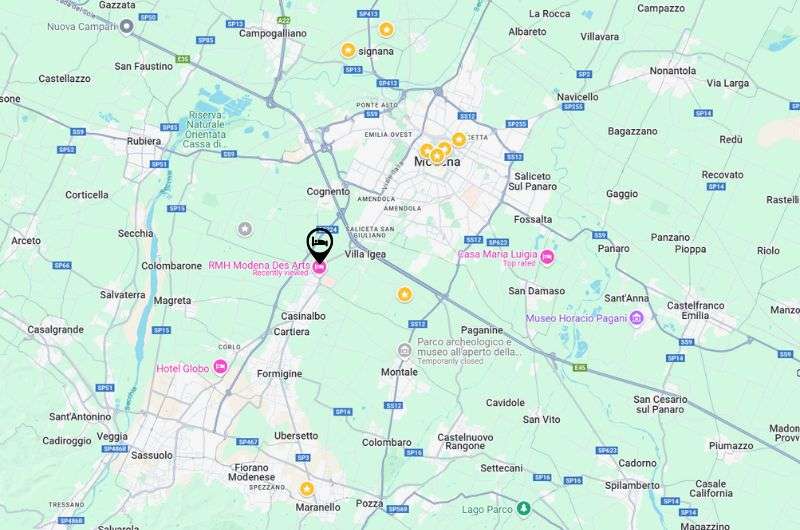
As you can see, you’ll need to travel a bit to hit all the best things to do in Modena. Because of this, the RMH Modena Des Arts Hotel is a very convenient base—a superb hotel in my opinion
A few top tips before we go into detail about things to do in Modena
- Avoid Saturdays and Mondays—Many places close early or don’t open at all, making it a nightmare to plan your day. Trust me, I had to spend couple more days in Modena because of this.
- Bring a car—Some of the best spots are far easier to reach by car. Public transport won’t cut it.
- Visit in the off-season—Fewer people, more charm. I went in November, and it was perfection—almost no one around!
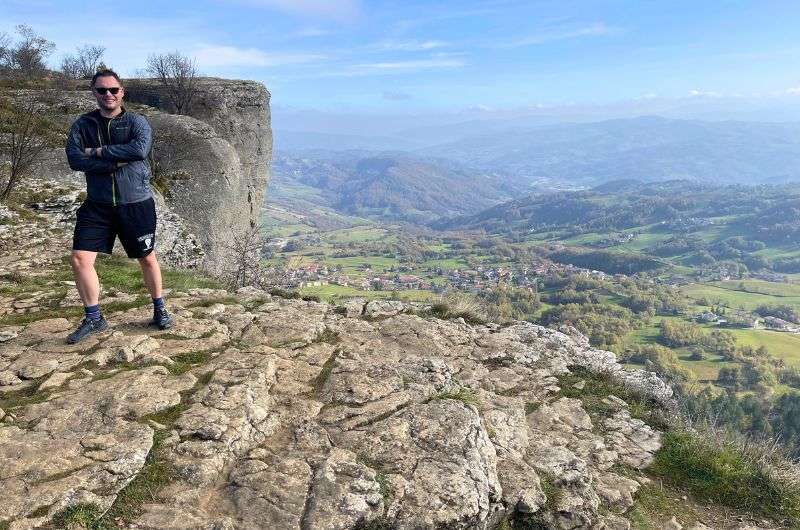
Checking out the nature outside Modena
My tip for a hotel in Modena Italy: RMH Modena Des Arts
Tucked just outside Modena, the RMH Modena Des Arts is one of those rare gems that checks all the boxes without breaking a sweat. It's modern ranks way up there among my favorite hotels in all of Italy.
It’s convenient: It’s conveniently close to the highway (but not too close), making it the perfect base for exploring Modena without the hassle of city-center congestion. It has a massive, free parking lot.
The beds are ridiculously comfortable. My favorite bonus is the pillow menu. I had one of the best sleeps of my life here—no exaggeration.
Breakfast was very good. Even in the off-season, the spread is top-notch, with a fantastic selection of hams, cheeses, and other Italian treats.
So, remember, the hotel in Modena you’re looking for is: RMH Modena Des Arts 41100 Modena Italy
1. 4 Madonne Cheese Factory—Taste all ages of Parmigiano Reggiano
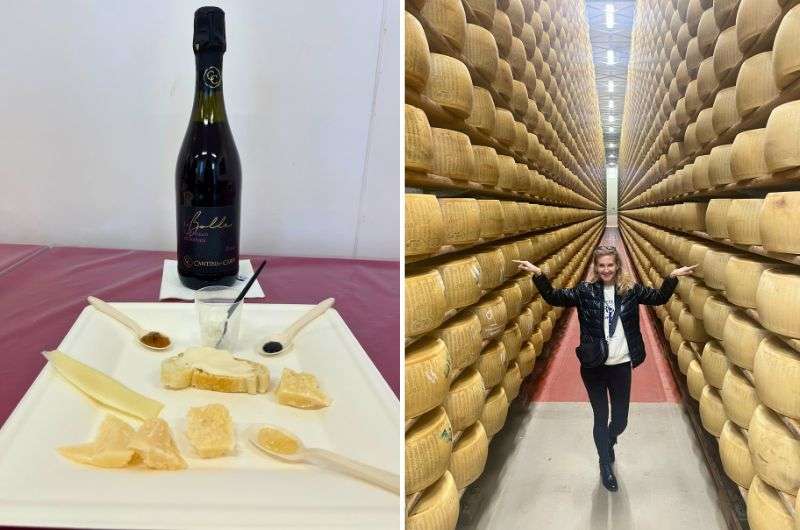
Madonne Cheese Factory is the best!
From my personal view this is absolutely the best thing to do in Modena.
Why this tour is worth it
The 4 Madonne Caseificio dell'Emilia, a prestigious producer of Parmigiano Reggiano, offers a fascinating glimpse into the world of cheese-making. This isn’t just a quaint operation—it’s an impressive production powerhouse. Inside, you’ll find 36,000 wheels of Parmigiano, each weighing 40 kg. With each wheel priced at around EUR 800, the scale is mind-boggling—over EUR 18 million worth of cheese aging in their storage at any given time!
The tour combines tradition, science, and some serious muscle. Workers, who are impressively strong from handling massive wheels of cheese, process the cheese daily (cows don’t take days off). They even clean the equipment using leftover whey instead of chemicals. On-site, they produce not only Parmigiano but also ricotta (locally known as "Richtrs"), adding to the experience.
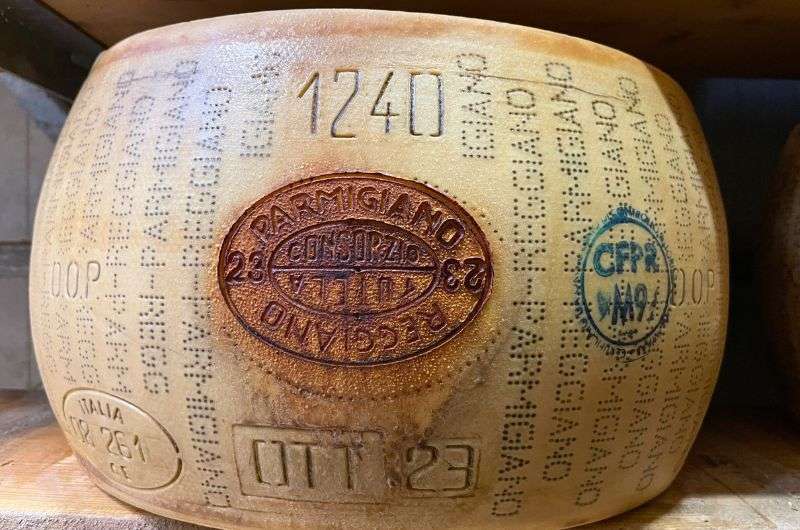
At the Madonna Cheese Factory, you'll be surrounded by these giant, high-quality parmigiano reggiano wheels
At the end of the tour, you’ll enjoy a guided tasting of local ricotta and 12-, 18-, 24-, and 36-month Parmigiano. Experiencing the flavor evolution is a treat, offering insight into why this cheese is so revered.
If you’re a fan of cheese or traditional craftsmanship, this tour is a must-see. It’s informative, entertaining, and utterly delicious.
Fun facts about Parmeggiano Reggiano
- Did you know a single 40kg wheel of Parmigiano requires 500 liters of milk? The factory processes 50,000 liters of milk daily from about 2,000 cows, which means the workers are incredibly strong from hauling around heavy cheese all day.
- There are four types of Parmigiano, determined by the breed of cow producing the milk. Everything must be locally sourced from the Parma, Modena, or Reggio Emilia regions to qualify for the Parmigiano Reggiano name. After one year of aging, it gets a protected designation of origin (PDO) certification, with two quality grades.
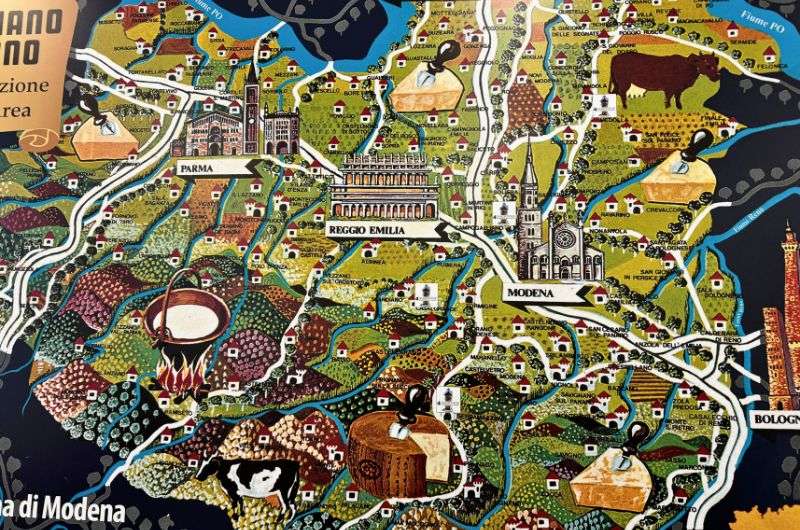
Parmigiano Reggiano must be locally sourced from Parma, Modena or Reggio Emilia
- Parmigiano wheels are tested with a hammer to ensure quality and submerged in water with 25% salt. They must age for at least 12 months, absorbing salt and developing flavor. Aging continues in 80% humidity at 17°C.
- Parmigiano is packed with vitamin B and phosphorus, making it surprisingly nutritious.
- Nutritional Powerhouse: Parmigiano Reggiano is packed with protein, calcium, and other essential nutrients, making it a favorite among health-conscious foodies.
- Protected Designation of Origin (PDO): Parmigiano Reggiano can only be produced in specific areas of Italy, including the Emilia-Romagna region where Modena is located. This ensures its authenticity and quality.
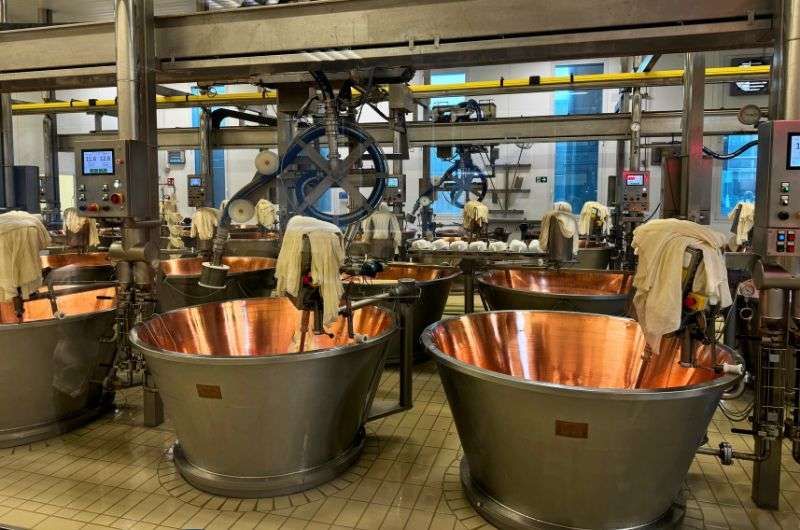
It was interesting to see the stages of making parmigiano reggiano
Practical information
- The tour lasts about 1 hour and costs EUR 20 per person, including a tasting of 4 types of Parmigiano Reggiano.
- It’s easily accessible from the highway, but you need to book a day in advance. We showed up without a reservation, and they politely told us, "Sorry, come back tomorrow at 9."
- A bonus: The Acetaia Giusti is just a kilometer away, so you can conveniently visit both in one trip.
- Tours generally start around 10 am.
- Wear clothes that can be washed easily because—surprise—it will end up smelling like a cheese factory.
2. Acetaia Giusti—Be surprised by how hard it is to make traditional balsamic vinegar
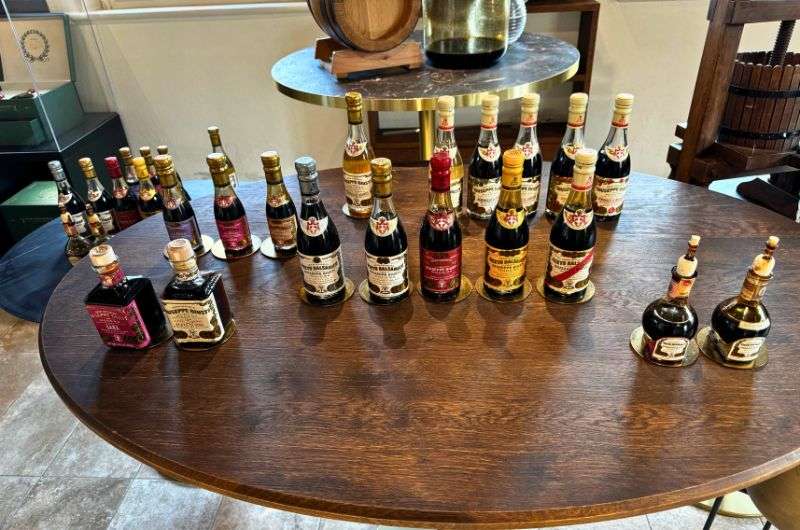
Acetaia Giusti
Acetaia Giusti isn’t just a vinegar factory—it’s a time machine that takes you back to 1605, when the Giusti family decided vinegar could be more than just an afterthought.
It’s also the oldest balsamic producer in the world, so yeah, they know what they’re doing. Their shop in Modena has been open for over 400 years, which is older than most countries. If that doesn’t impress you, we need to talk.
Why this tour is worth it
For me, this tour was like discovering that balsamic vinegar has a secret life as a rockstar. The museum walks you through the Giusti family’s legacy, revealing how they became "Royal Suppliers of Balsamic" in 1929. Apparently, their 90-year-old balsamic was so good, even royalty couldn’t resist. (Honestly, I wouldn’t be surprised if they bribed a few kings with it.)
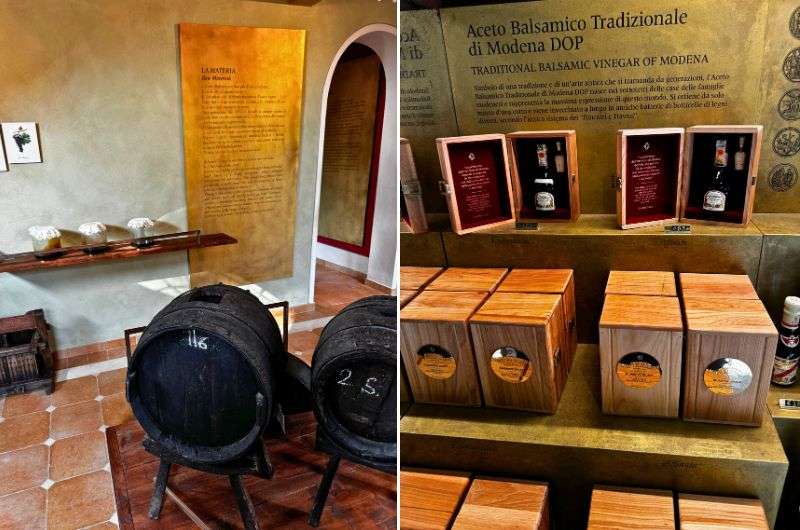
You’ll get to know everything about the Giusti family and their balsamic production legacy
Fun fact: The real mic-drop moment? Learning they crushed it at the 1889 World Fair in Paris. Back then, balsamic vinegar wasn’t even a thing internationally, but they walked away with top awards—competing against all foods, not just condiments. Basically, they made balsamic the Beyoncé of the culinary world.
And then, there’s the tasting. Oh, the tasting. Picture me standing there, sampling spoonfuls of liquid gold and mentally redesigning my kitchen to showcase my future vinegar collection. I ended up buying two bottles: one with four medallions (like Michelin stars but for vinegar) and a truffle-infused balsamic that might actually make me cry when it runs out. The staff explained which balsamic pairs with what (spoiler: pretty much everything), and the beautiful packaging had me feeling like a gift-giving genius.
This tour isn’t just about vinegar—it’s about experiencing a piece of Italian culture that’s been simmering (literally) for centuries. Visiting the oldest vinegar producer in the world felt like I’d unlocked a secret level of food appreciation. And did I mention it’s free? Seriously, you’ll leave wondering if you should tip someone.
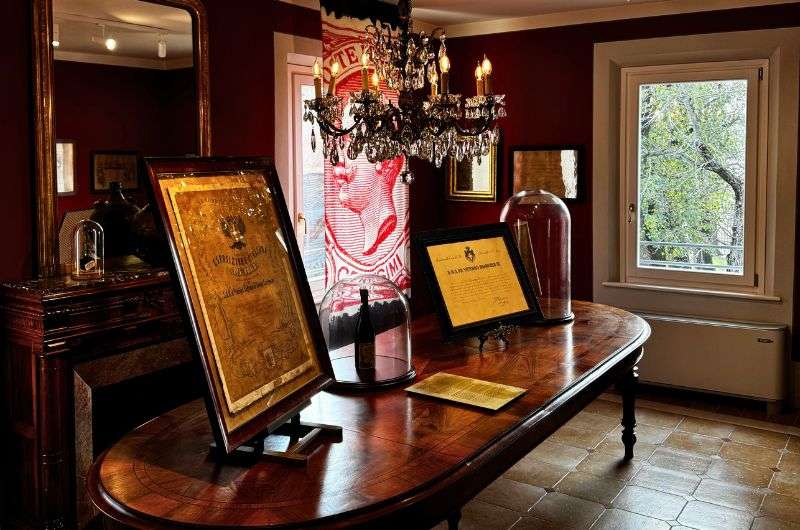
Tasting, history, making fun of my girlfriend, nothing was missing!
If you’re a foodie, a history buff, or just someone who likes free stuff, this is an absolute must-do. Trust me, your taste buds will thank you, and so will anyone lucky enough to get a bottle as a gift—if you can part with it. Oh, and my girlfriend absolutely hates balsamico so I scored two wins that day as she had to taste it.
I like fun facts so here are some fun facts about balsamico:
- Traditional balsamic vinegar is aged in barrels for 10–25 years. Yes, you read that right—this stuff ages longer than most of your relationships.
- Balsamic vinegar has been an essential part of Italian culture for centuries. It’s not just a drizzle; it’s practically a religion.
Practical information
- The tour lasts about 1 hour and is completely free, which is amazing considering you leave with a gift!
- The estate has a large parking area and offers two guided tours daily in English. If you prefer, you can explore the museum on your own—also free.
- The tour showcases the Giusti family’s rich history and their traditional balsamic vinegar production.
3. Casa Museo Luciano Pavarotti—Learn about a genuinely nice person
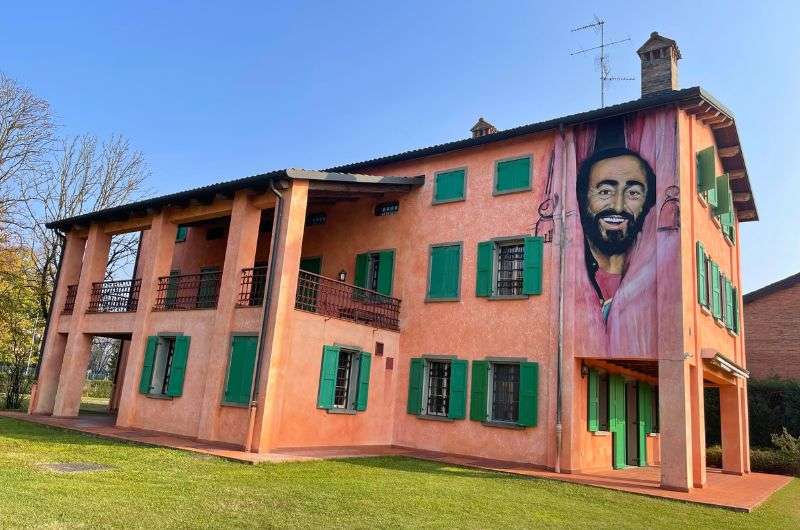
Luciano Pavarotti’s house
Luciano Pavarotti’s home (Casa Museo Luciano Pavarotti) is a mix of charm, modernity, and deeply personal storytelling. Built in the late '90s, the house reflects his passions, from his love of Puccini to the personal significance behind every single item in his collection. You’ll walk through 12 sections spread across four floors, each telling a piece of his story—personal and professional.
What really struck me was how the museum paints him as not just a legend, but as an incredibly positive and compassionate person. The guy won six Grammys and two Emmys, but his biggest achievement? Raising more money for refugees than any other private individual in history. That’s a mic drop moment right there.
The highlight for me was the top floor, where you’ll find personal letters from celebrities and dignitaries that reveal the depth of his personality. These letters are pure gold—they give you a glimpse of the friendships and respect he earned. It’s like reading a who's-who of global admiration.
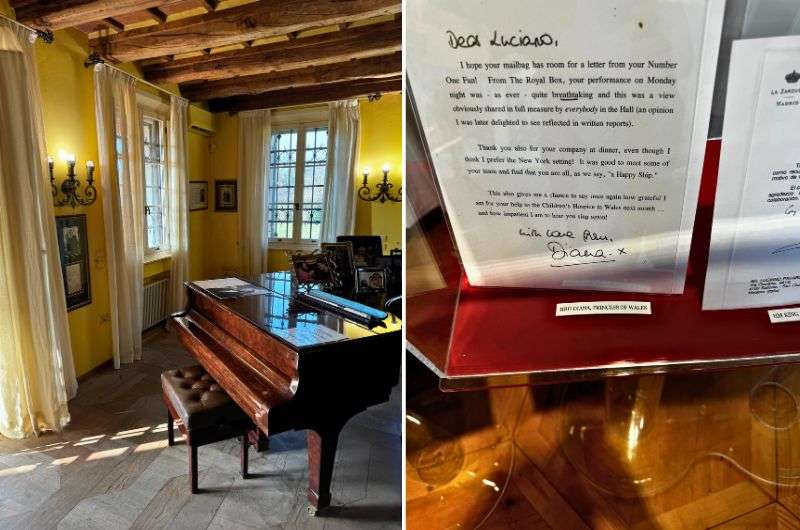
The top floor was the most interesting one
The house itself is so thoughtfully curated, it reminded me a bit of Pablo Neruda’s house (check the resemblance in my Chile itinerary). Every detail feels meaningful, showing Pavarotti’s warmth, joy, and endless curiosity. If you’re a fan of music, philanthropy, or just fascinating lives, this museum is a no-brainer.
Plus, you’re not just visiting a museum—you’re stepping into the life of someone who made the world a better place. That’s worth every cent.
Practical information
- Entry is EUR 12, and you get an audio guide in multiple languages.
- Don’t even think about skipping it to save money—profits go to a children’s foundation, so your ticket is basically a good deed.
- The house is in the middle of the countryside. If you don’t have a car, your chances of getting there are about as good as Luciano hitting a high note in flip-flops.
4. Duomo di Modena—Marvel at the works of the old masters
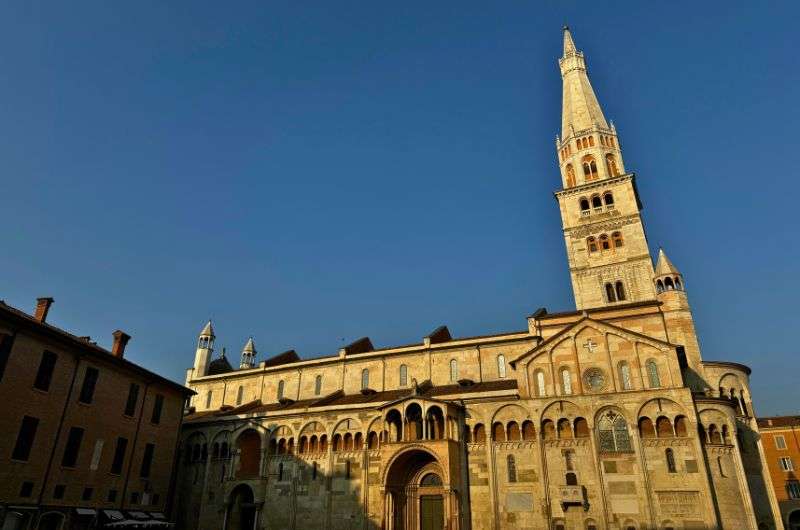
The jaw-dropping Duomo di Modena
Look, I’m just going to say it: in a country full of jaw-dropping Duomos, this one is… fine. Founded in 1099, it’s old, sure and also a UNESCO World Heritage Site. It is a respectable example of Romanesque architecture and had enough clout to influence the Renaissance. So, you know, good for it.
But if we’re ranking Duomos, Modena Cathedral is not making the highlight reel. It’s more like the dependable background character in Italy’s architectural drama. That said, there are still some cool bits. The tunnel connecting the cathedral to the Ghirlandina Tower? Now that’s interesting. It’s an actual passageway linking two squares, and you don’t see that every day—bonus points for creativity.
Speaking of the Ghirlandina Tower, it’s 90 m (295 ft) tall and built in the same era as Modena Cathedral. Together, the tower and Duomo are like an old married couple: one’s holding it down architecturally while the other occasionally steals the spotlight.
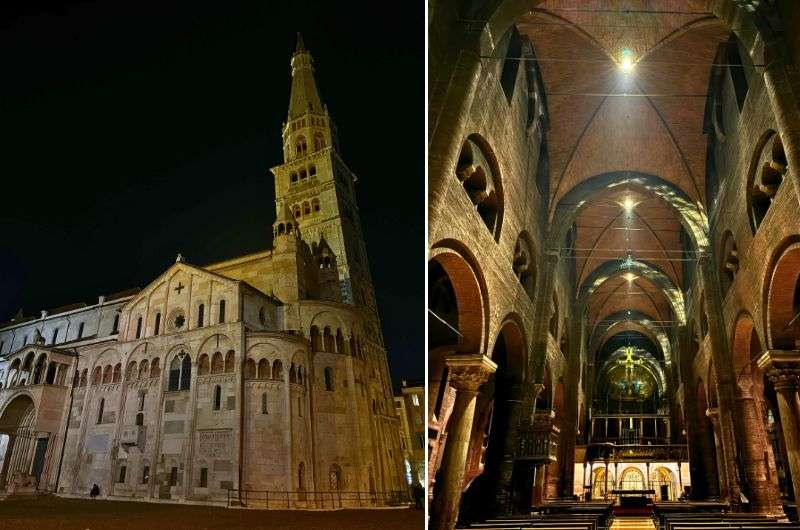
I loved the vibe of Duomo di Modena during our evening walk through the city
For me, the real charm is in the atmosphere. By day, it’s a pleasant slice of history. By night, the lighting adds a mysterious, moody vibe that almost distracts you from its average-ness. Sure, it’s not going to compete with Florence or Milan, but it’s still worth a visit if you’re already in Modena. And hey, it’s free—so even if it doesn’t blow your mind, at least it won’t empty your wallet.
Practical Information
- Entry is free, which is exactly the right price for a cathedral that’s solidly meh by Italian standards.
- It’s open late, and honestly, the dim evening lighting gives it some much-needed personality—kind of like putting a moody filter on a so-so photo.
- Situated on a big square, it’s perfect for snapping photos that scream, “I went to Italy and saw a Duomo.”
5. Panini Museum—Much better value for money than Ferrari (cost: free)
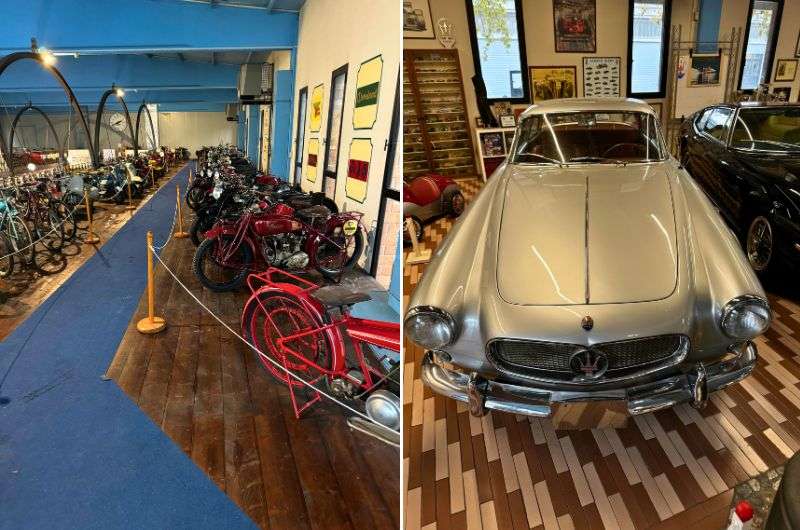
Another great car museum—Panini
If you’re expecting a high-tech, glitzy car museum, you’re in for a curveball. The Panini Motor Museum has a quirky “car-meets-farm” vibe, but don’t let the setting fool you—it’s a hidden gem for gearheads. In fact, I’d argue it has a better car-to-ticket-price ratio than the Ferrari Museum. (Yes, I said it.)
The stars of the show are the Maserati race cars, including some incredible single-seaters from the 1930s that could hit 260 km/h. Just imagine hurtling along at that speed back then—it’s both impressive and mildly terrifying. Maserati, being ahead of the curve, was also making limousines back in the day. Clearly, they figured out early that dads don’t just want practical family cars—they want sportscars with room for the kids’ soccer gear.
One of the coolest things here is the collection of one-off models, like the Maserati Chubasco. Sure, it looks suspiciously like a Honda XSR, but it’s still a rare beauty. If you’re a fan of car design or automotive history, this is a great chance to get up close to some truly unique machines.
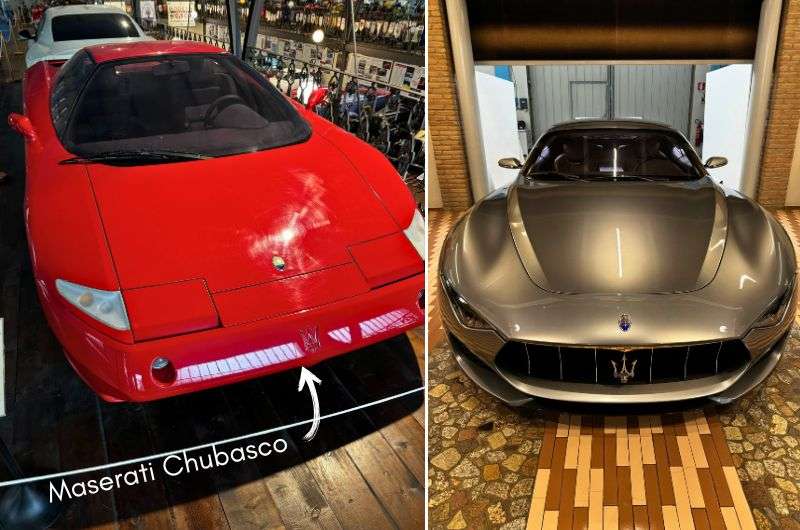
You can find a collection of one-off models of Maserati
While it may not have the sleek polish of Ferrari’s flashy showrooms, the Panini Motor Museum has its own charm. It’s compact, packed with history, and entirely free. So, if you’re into cars—or just want to pretend you know about them for your Instagram feed—this spot is absolutely worth a quick detour. Plus, let’s be honest, free is always a good look.
Practical info
- The visit takes about 30 minutes, making it a perfect quick stop to scratch your car-lover itch.
- It’s tucked away on a large farm—yep, a farm—and tickets are free, so no need to stress about splurging on admission.
- The focus here is on Maserati, and honestly, there’s a surprising number of cars packed into this tiny space.
6. Ferrari Museum, Maranello—Expect far fewer cars than you’d hope
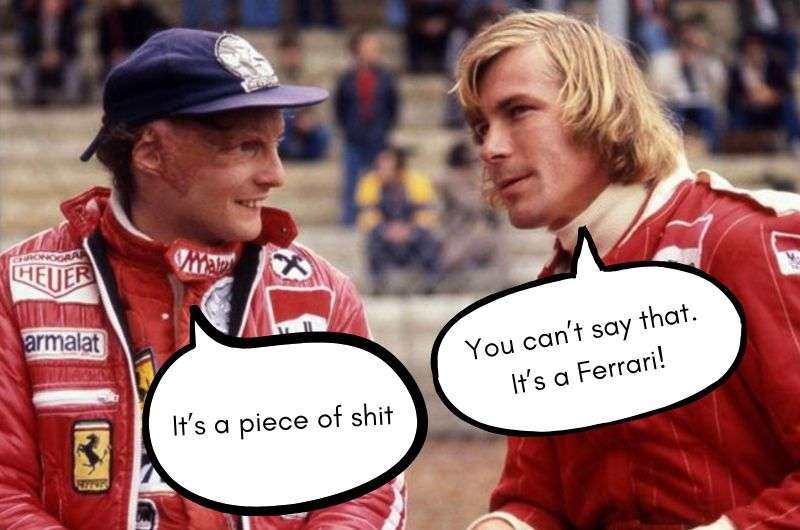
Let’s start with the vibe: the museum's slogan, “The Best Ferrari Ever Made Is The Next One”, perfectly sums up the experience. It’s not just a car brand—it’s a religion. Walking in feels like stepping onto hallowed ground, with beautifully curated displays showcasing Ferrari’s history and design brilliance.
The cars are the real stars here, of course, and they look absolutely spectacular. Standouts for me? The SF90 Stradale and the legendary F40—both had me drooling. Each car gets its own well-lit stage with plenty of space to shine. It’s like a showroom, but fancier, with a timeline setup that’s borderline perfection for anyone with OCD tendencies.
Now, let’s talk Victories Room—this is where Ferrari flaunts its racing triumphs, and it’s straight-up intoxicating. Every championship-winning car is there, and it’s like the Hall of Fame for speed junkies. If you’re a motorsport fan, this room alone is worth the trip.
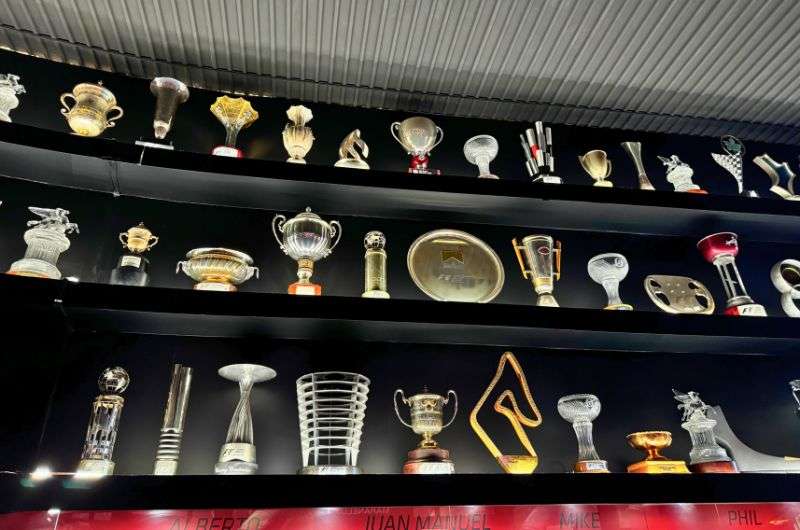
A showcase full of trophies in the Victories Room
The museum also does an excellent job of telling the Ferrari story. Using QR codes, you can access interviews with engineers and mechanics, plus fun facts about the cars. All the info is in English, and it’s so well curated, other museums should take notes. Seriously, I left wishing all exhibits were this engaging.
That said, the museum lacks interactivity. No simulators, no hands-on experiences—just a lot of looking and admiring. But honestly, when the cars look this good, who needs gimmicks?
My personal highlights
Of course, I had to stop for a photo—Italian hand gestures fully activated—next to a Ferrari because, well, “It’s a Ferrari!” The most Italian thing ever.
One surprise? Despite the off-season visit, the place still felt busy, so I can’t even imagine what it’s like in peak season. And while paying for parking annoyed me, the Ferrari 315 and its insane design totally made up for it. At the end of the visit, there’s even a chance to test-drive a Ferrari, though I skipped it because I’m already dangerous enough in a hatchback.
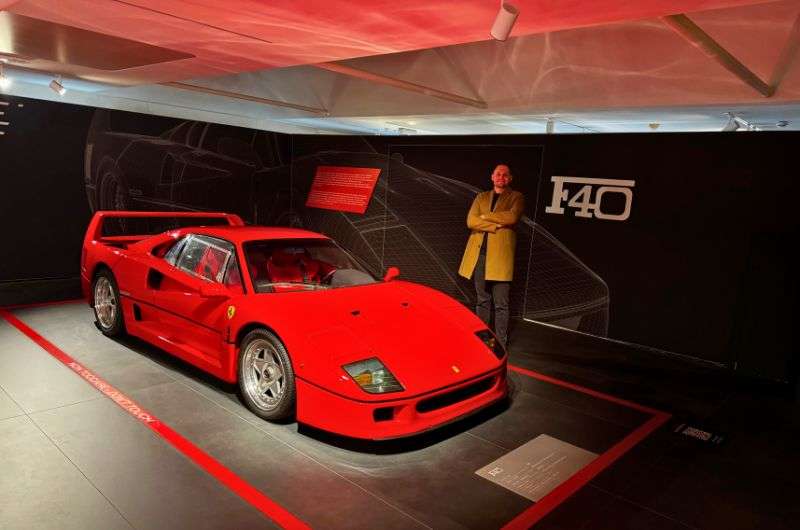
“It’s a Ferrari!”
Why I was not that impressed
First off, for EUR 27, I expected more—more cars, more interactivity, more… something. There’s no hands-on fun here, no simulators, no thrills beyond ogling the shiny vehicles. Honestly, it feels like Ferrari is banking on its name alone to carry the experience. Even the Victories Room, which is supposed to be the grand finale, left me feeling a bit meh.
Add to that the parking fee (yes, I’m still salty about it) and the crowded space—even in the off-season—and it all just feels a little too much like they’re squeezing every last euro out of you. And maybe I’m a bit of a cheapskate, but I couldn’t stop comparing it to free museums with way more personality, like the Panini Motor Museum, but it’s still better than the Enzo Ferrari Museum.
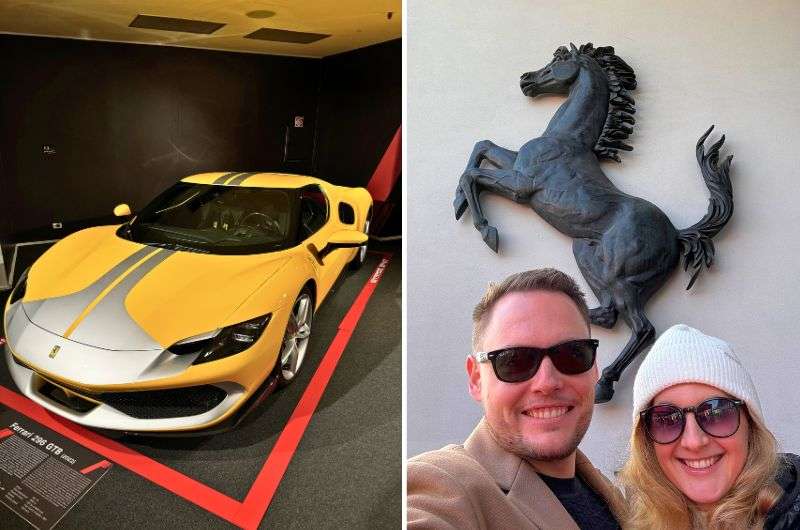
It was all just “walk and look”. I missed more interactivity
Practical information
- The museum is short and pricey—about 1 hour tops for EUR 27, which, let’s be real, is a bit of a stretch.
- Get there early: I arrived at 9:30 am, and there was already a line. During peak season, you’ll definitely want to buy tickets in advance unless you enjoy standing around muttering, “Is this even worth it?”
- Parking is EUR 1/hour, and the lot is tiny. I get that they want to control the chaos, but charging for parking at a museum? Really, Ferrari?
7. Enzo Ferrari Museum—Expect even fewer cars, but more history
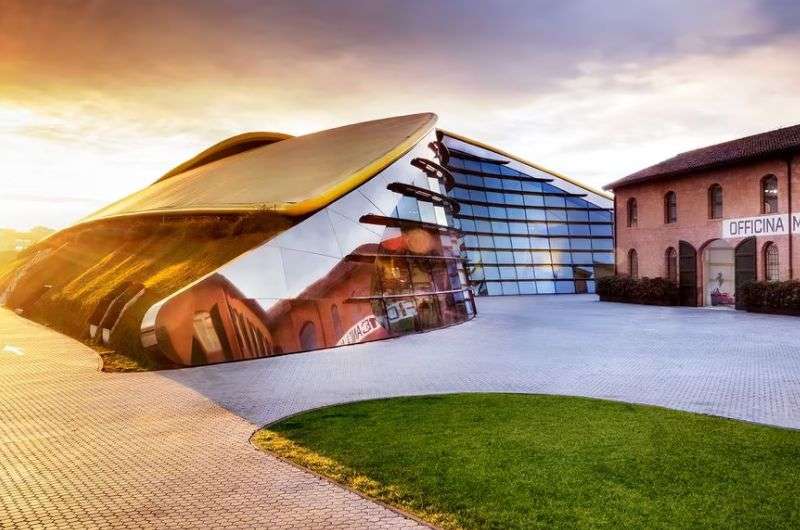
This is the cool modern building of The Enzo Ferrari Museum. More information at Ferrari.com
The Enzo Ferrari Museum is housed in a gorgeous, modern building that makes a great first impression. Inside, though? It’s more of a slow burn. The Enzo Ferrari museum tells the story of Enzo Ferrari’s life, from his childhood in Modena to the creation of one of the most iconic brands in the world. If you’re a history buff, there’s some charm in seeing how a local kid became a global legend.
But here’s the thing: it’s not really about the cars. Sure, there are a few Ferraris on display, but they’re spaced out like VIPs at a private party. The focus is on multimedia exhibits and timelines, which are well-done but not exactly thrilling. It’s interesting, sure, but it’s also a little… slow.
My impressions of the museum
I walked out feeling like it was fine, but not much more. The museum captures the spirit of Enzo Ferrari’s ambition, but without enough cars to back it up, it feels like something’s missing. If you’re a die-hard Ferrari or Enzo fan, you’ll probably appreciate it. For everyone else? It’s a decent way to spend an hour, but don’t expect it to leave you revved up.
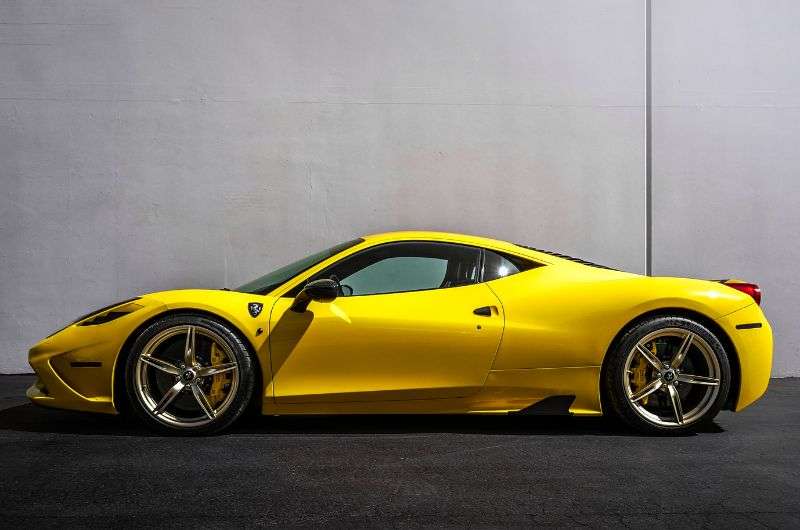
Ferrari here, Ferrari there...
Practical information
- Tickets are EUR 22, and parking is EUR 1/hour. It’s not cheap, but at least the building is nice to look at.
- The focus here is less on cars and more on Enzo Ferrari’s life and legacy, so don’t come expecting a showroom packed with Ferraris.
8. Torre Ghirlandina—See the city through iron bars
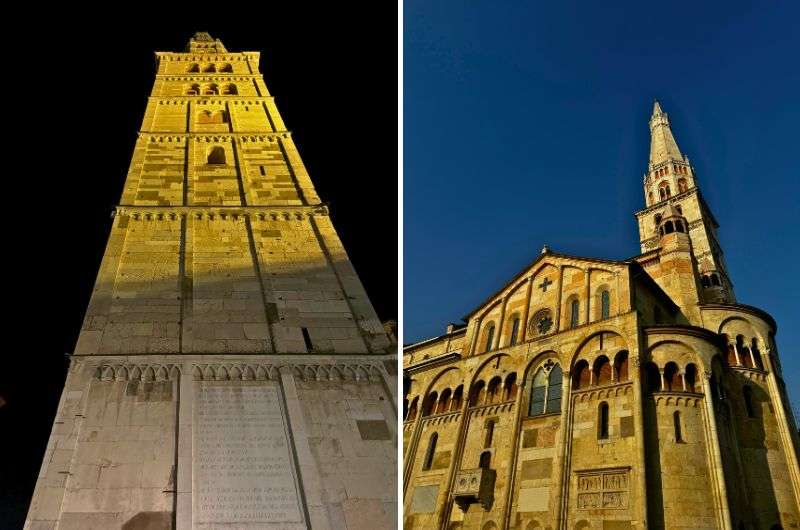
Ghirlandina Tower—almost didn't fit in my photo
Torre Ghirlandina, Modena’s iconic 90-meter-tall bell tower, is part of the Duomo di Modena and a UNESCO World Heritage Site. It’s Modena’s pride and joy, offering sweeping views of the city and its surroundings such as Piazza Grande. While the climb isn’t for the faint of heart, it’s a fun way to get a different perspective on this beautiful city.
Fun fact: Inside the tower, you’ll find Modena’s infamous stolen bucket, a trophy from their medieval war with Bologna. That’s right—a bucket. It’s a hilariously random artifact, but it’s celebrated like a championship prize.
Even if you skip the climb, the tower is a stunning landmark that’s worth admiring from the ground. For EUR 3, it’s a fun, quirky, and historic addition to your Modena itinerary.
Practical information
- Tickets are EUR 3 per person, which is a bargain for such a historic landmark.
- The tower stands 90 meters tall, and you’ll need to tackle the stairs to reach the top—no elevators here, just good old-fashioned cardio.
9. Museo Archeologico—Unearth ancient treasures
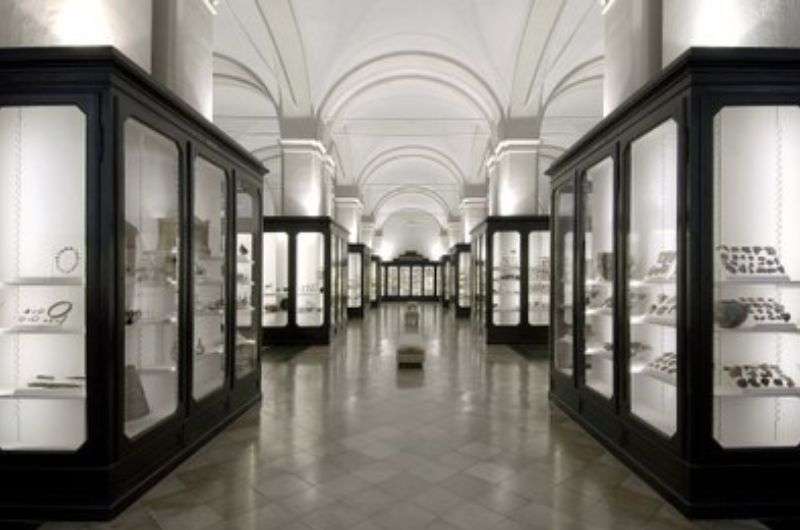
Details about the Museo Archeologico @ Museocivicomodena.it
The Museo Archeologico is a small but fascinating peek into Modena’s ancient history. From Bronze Age artifacts to Roman relics, it’s a treasure chest of items that showcase the area’s evolution through millennia.
Highlights include beautifully preserved Terramare tools, pottery, and even burial artifacts that give you a glimpse into life (and death) thousands of years ago.
The museum is compact, but it’s perfect if you want to see something different from Modena’s food and car scene. Bonus: it’s indoors and air-conditioned, so it’s also a great escape from the weather.
Practical information
- Entry: Usually free (because Modena loves to spoil you).
- Time Required: 30–45 minutes—a quick but rewarding stop.
- Location: Inside the Palazzo dei Musei, so you can easily pair it with other museums.
10. Palazzo Ducale di Modena—Snap some stunning pics
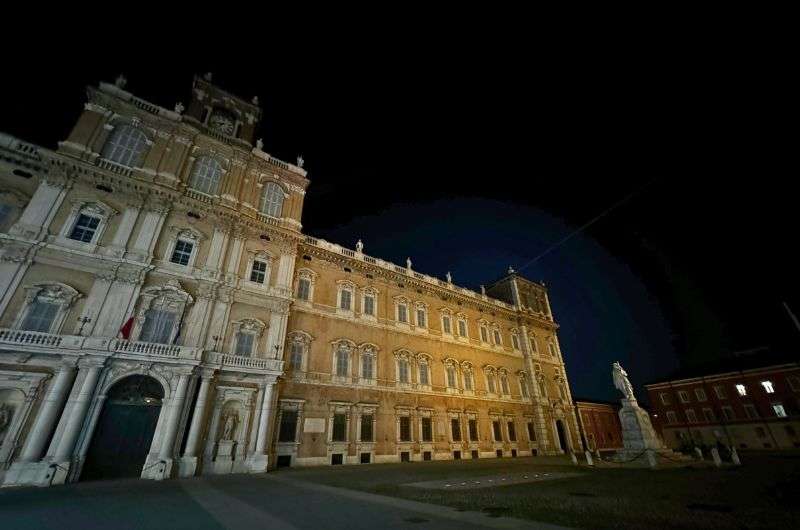
Palazzo Ducale di Modena
The Palazzo Ducale is pure grandeur. Built in the 17th century as the seat of the Este Dukes, this Baroque beauty now houses the Italian Military Academy.
While the interiors are rarely open to the public, you can still marvel at the ornate façade, the sprawling piazza, and the sheer scale of the place.
Pro tip: Pair your visit with a stroll around Piazza Roma, where you’ll get stunning views of the palace from every angle. Even if you can’t go inside, it’s a must-see for its historical significance and photogenic charm.
Practical information
- Entry: Closed to the public most of the time, but the exterior is worth the visit.
- Best for: Gorgeous photos and a quick dose of royal vibes.
- Time required: 15–30 minutes, depending on your Instagram needs.
11. Museo Civico di Modena—Explore Modena’s Rich Civic History
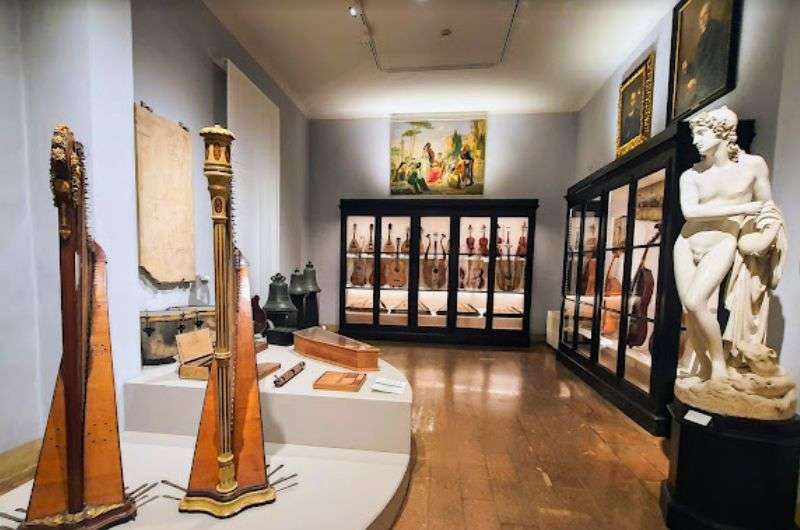
Museo Civico di Modena
The Museo Civico is where Modena’s personality shines. This museum covers everything from medieval weaponry to intricate ceramics, ancient manuscripts, and a collection of quirky local treasures. One standout section is dedicated to Modena’s guild history, showcasing the craftsmanship that put the city on the map.
Practical information
- Entry: Free or very affordable (a nice break for your wallet).
- Time required: About an hour, depending on how curious you are.
- Location: Also in the Palazzo dei Musei—make it a two-for-one trip with the Archaeological Museum.
The museum’s layout is easy to follow, and it offers a little bit of everything—art, history, and even a few unexpected surprises. It’s a perfect stop for anyone wanting a deeper connection to Modena’s roots without committing to a massive museum marathon.
That concludes my list of the best things to do in Modena. But how do you actually combine it all into one day? Here’s my itinerary suggestion:
See Modena in a day: itinerary
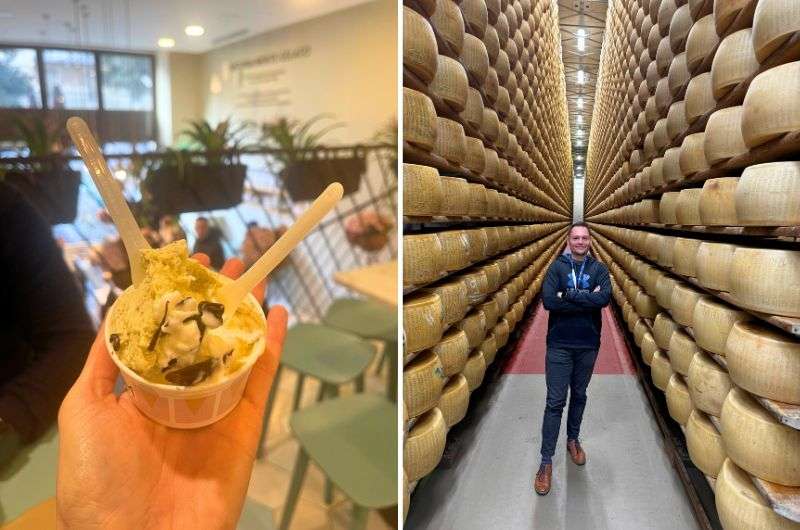
Don't forget to enjoy delicious Modenian delicacies
I have put together a 1-day itinerary for Modena and it comprises all the best things to do in Modena, so here we go:
Stop 1: Start your day with a Ferrari in Maranello
This is a quick stop anyway and it will be much less crowded in the early morning with a high chance of available parking spots. You will spend a maximum of 1 hour here and then drive a few minutes to Casa Museo Luciano Pavarotti.
Stop 2: Luciano Pavarotti Museum
Again, this will be quite a quick stop, 1 hour max. Remember, free parking is in front of the building. After enjoying the whim of the life of Luciano you can drive 10 minutes to Panini Motorsport Museum.
Stop 3: Umberto Panini Motor Museum
This is another quick stop—expect 30 minutes max. Parking is right there in the front and everything is free. From here it is best to drive north to the 4 Madonne Factory. The drive will take 20 minutes.
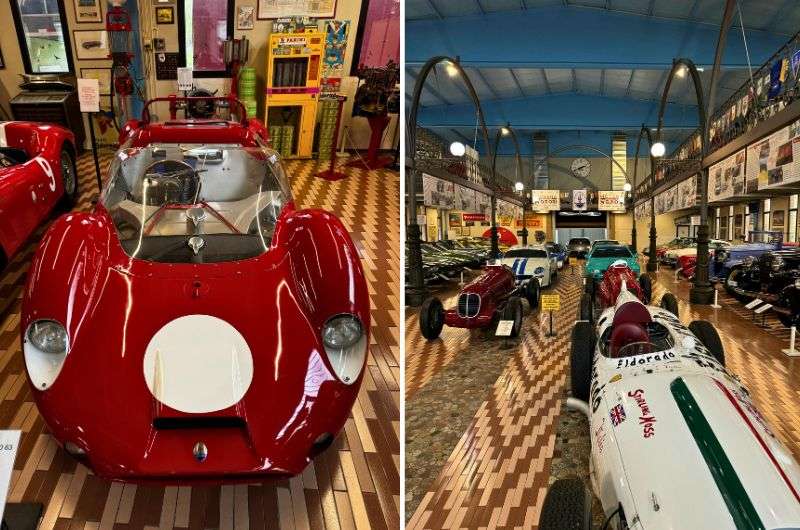
Umberto Panini Motor Museum (better than the Ferrari museum...)
Stop 4: 4 Madonne Cheese Factory
This tour will take you 1 hour. Free parking is in front of the factory. (Aim for the 11:30 am tour in English) From here you can drive 10 minutes to Acetaia Giusti.
Stop 5: Acetaia Giusti—balsamico vinegar producer
Though this stop is very interesting it will take you at most 20 minutes and then about the same time for shopping and free tasting.
From Acetaia you can finally head to actually see Modena. Drive to the Modena city center—the most useful of the parking lots I found is Parcheggio city center or, if you are lucky enough, you can snag a spot in the streets and pay via using the EasyPark app.
Stop 6: Palazzo Ducale Modena
You can make a quick stop in Palazzo Ducale and then walk to the city center, where you will see Modena Cathedral and the legendary Bell Tower.
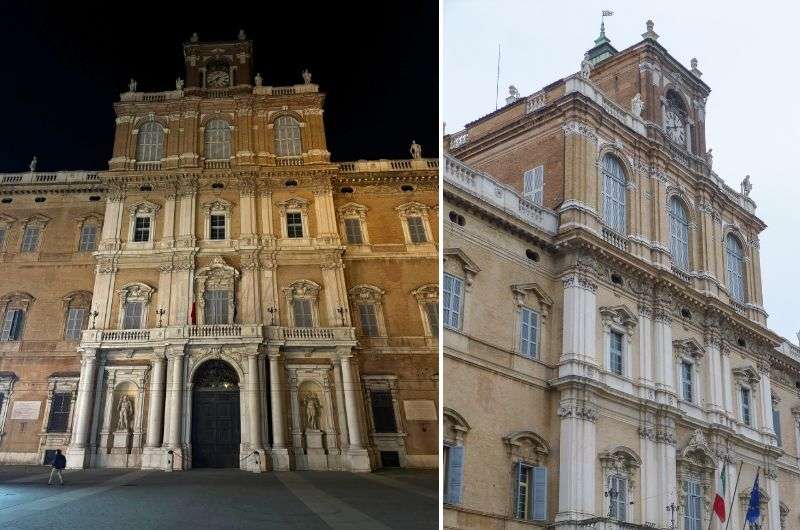
Palazzo Ducale Modena
Stop 7: Modena Cathedral and Torre Ghirlandina
I would spend a maximum of 1 hour in both attractions and Piazza Grande. It is absolutely majestic from the square and the tower is worth visiting to get a different perspective of Modena. From here i tis just a quick walk to Museo Civico.
Stop 8: Museo Civico
It is getting late in the afternoon by now, so you can spend the rest of day in this museum. Timing here is up to you, you have nowhere else to be, so take as much time as you like.
If you have any time left over, wander the amazing streets of Modena.
Stop 9: Dinner at Al Duomo and Franceschetta58
I recommend dinner at one of these 2 restaurants: Al Duomo, or Franceschetta58 for a fine dining experience from the owner Massimo Botturo (one of the best chefs in the world who won 3 Michelin stars in Osteria Franceschana).
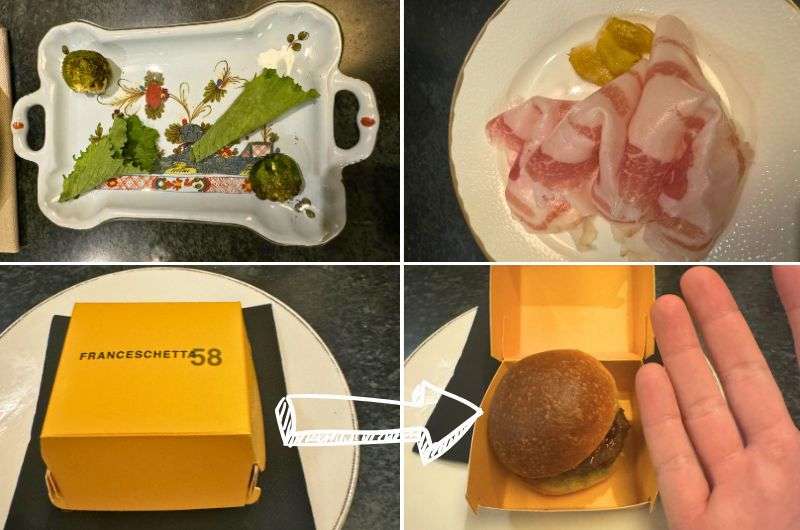
Franceschetta58 serves delicious food!
FAQs
Is Modena worth visiting?
Modena is absolutely worth a visit—at least for a day. It is one of the most unique cities in Italy, mainly because of its unique combination of Italian Motor Valley museums (Ferrari, Panini Motorsport Museum and Enzo Ferrari Museum) and food tours, where you can learn a lot about local delicacies getting the world class. It's one of the oldest cities in Italy which was established back in the Roman times.
When is the best time to visit Modena?
Most people visit Modena in the summer, which has disadvantages such as big crowds and high prices. I suggest you visit in early fall pr late spring because you will have much milder weather and a lot less people around with friendlier prices.
How long do I need in Modena?
Most visitors spend 1 day in Modena as a day trip, but I recommend spending a night in Modena to enjoy less crowded streets and witness the city at night. I would even argue spending 2 days in Modena so you can really see everything it has to offer.
Sometimes, all you need to do is take the first step... I've filtered out the best hotels in Modena for you
Save it for yourself to come back to later, or share with your friends on social media!
This post contains affiliate links. I earn a small commission if you make bookings through my links, at no additional cost to you. Thank you for your support!
My ranking of the top things to do in Modena, Italy:
Map of things to do in Modena for a day
A few top tips before we go into detail about things to do in Modena
My tip for a hotel in Modena Italy: RMH Modena Des Arts
1. 4 Madonne Cheese Factory—Taste all ages of Parmigiano Reggiano
2. Acetaia Giusti—Be surprised by how hard it is to make traditional balsamic vinegar
3. Casa Museo Luciano Pavarotti—Learn about a genuinely nice person
4. Duomo di Modena—Marvel at the works of the old masters
5. Panini Museum—Much better value for money than Ferrari (cost: free)
6. Ferrari Museum, Maranello—Expect far fewer cars than you’d hope
7. Enzo Ferrari Museum—Expect even fewer cars, but more history
8. Torre Ghirlandina—See the city through iron bars
9. Museo Archeologico—Unearth ancient treasures
10. Palazzo Ducale di Modena—Snap some stunning pics
11. Museo Civico di Modena—Explore Modena’s Rich Civic History
See Modena in a day: itinerary










Comments | Thoughts? Give us a shout!